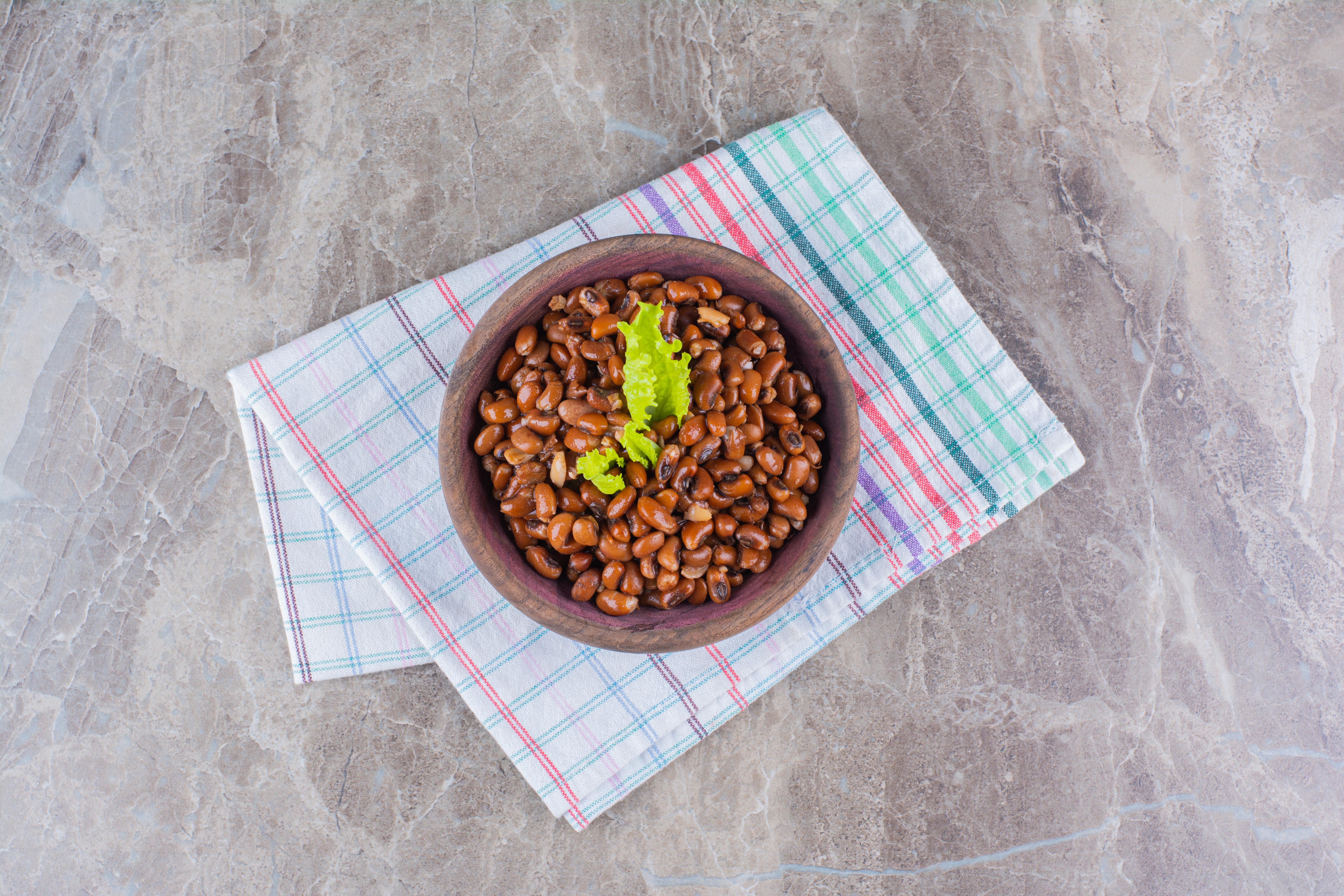Have you ever wondered if your furry companion can share in the nutritional benefits of beans? Beans are common in our food, but can they also be good for your dog? Is it safe for your dogs to eat beans, and what kinds should they have?
Beans, in moderation, are a healthy addition to a dog’s diet. Green beans, black beans, lima beans, pinto beans, garbanzo beans, kidney beans, lentils, navy beans, and soybeans offer protein, fiber, vitamins & minerals. When properly prepared, all these beans can enhance your dog’s health.
Stay tuned as we delve deeper into the world of beans and legumes for dogs. You’ll learn:

Are Beans Good for Dogs?

If you prepare beans the right way, they can be a healthy part of your dog’s food. Dogs are omnivores – so they can benefit from these beans. Beans are good because they have:
They don’t have much fat, and their fiber helps keep blood sugar levels stable.
But it’s important not to give your pup too many beans. Feeding your dog beans a lot can cause problems like constipation, or it can make them gassy. And, when you start giving beans to your dog, mix a little bit with their usual food, this helps your dog get used to them slowly and avoids digestive discomfort.
Top Advantages of Beans for Dogs
Beans, a versatile and nutritious food, offer a range of benefits for dogs. Let’s uncover how these simple legumes can significantly improve your dog’s health and well-being.
What Kind of Beans Can Dogs Eat?

With over 400 varieties of beans worldwide, it might seem overwhelming. But only a few are commonly found in stores, and luckily, several are great for dogs. Here are the beans your dog can safely enjoy:
1. Green Beans (String Beans)
Green beans are perfect for dogs as a healthy treat. They’re low in calories yet packed with fiber. And these beans also contain essential vitamins like K, A, and C & important minerals like potassium and folate. But – be cautious with the strings on green beans. They can be a choking risk for your dog. It’s best to chop them into smaller pieces before feeding them to your pet.
2. Black Beans
These beans are a treasure trove of antioxidants that are good for your dog. They’re also rich in fiber, potassium, and magnesium. When preparing these beans for your dog, keep them simple and cook them without adding any strong spices or seasonings that could harm your dog.
3. Lima Beans (Butter Beans)
Lima beans are a fantastic choice for your dog’s diet. They’re loaded with fiber and protein. These help your dog maintain a healthy weight. Also, they keep the digestive system running well and make your dog feel full. Packed with nutrients like calcium, phosphorus, iron & magnesium – these beans are beneficial in many ways. These make a convenient addition to your dog’s meal and are available in:
4. Pinto Beans
Pinto beans are also safe and good for dogs. They provide fiber, protein & antioxidants. They contribute to your pet’s immune system health. These are only ideal when cooked simply without flavorful seasonings.
5. Garbanzo Beans (Chickpeas)
Chickpeas are another great option. They are high in protein and fiber. And it’s important to cook them thoroughly before giving them to your dog. But be sure to steer clear of chickpea-based spreads like hummus. These often contain garlic or other ingredients that are harmful to dogs.
6. Kidney Beans
Kidney beans can be dangerous for dogs if they’re raw because of their high phytohaemagglutinin content – a toxin harmful to dogs. But, when they are cooked, kidney beans become safe in small amounts. They are filled with protein, fiber, antioxidants, and essential vitamins. And always monitor the quantity, as too many can be harmful.
7. Lentils
Lentils are safe for dogs, but only if they’re completely cooked. They come in two types:
Split lentils are softer and turn a bit like porridge when cooked. While whole lentils keep their shape after cooking.
Both types provide iron, fiber & protein, making them a healthy addition to your dog’s diet.
8. Navy Beans
These are small, white beans that are best for your dog when cooked from their dried form. You should avoid canned navy beans because they often have salt and preservatives, which aren’t good for dogs.
9. Soybeans (Edamame)
Soybeans – also known as edamame in their immature form – are a great source of protein and are commonly found in dog food. They can be served to your dog either raw or cooked. Soybeans are rich in:
Edamame, the young soybean, is also safe and healthy for your dog to eat.
Types of Beans You Shouldn’t Give Dogs To Eat
While beans are generally good for your pup, some types are not safe. Here’s a list of beans you should avoid:
If your dog eats coffee beans, you must get them to a vet immediately.
These beans are super toxic, and you should completely keep your dog away from them.
How To Safely Prepare Beans for Dogs
Getting beans ready for your dog the right way is important. This makes sure they get the health benefits without any bad effects. Here’s how to do it:
How Many Beans Your Dog Can Eat Safely
Determining the right amount of beans for your dog involves a balance between nutritional benefits and potential digestive issues. Beans are good for them, but they should only be a small part of their diet. Here’s how to know the right amount:
Conclusion
As you navigate the journey of responsible and loving dog ownership, understanding the role of beans in your furry friend’s diet is essential. The different types of beans that are safe for dogs, like black & green beans, offer a healthy snack choice. And they also add important nutrients like protein, fiber, and vitamins to their diet.
Remember – it’s important not to give too much. Adding beans to your dog’s diet slowly is best for their health. When you pick the right beans and prepare them correctly, you help keep your dog healthy and happy. Embrace this knowledge as a tool to enhance your dog’s diet, making every mealtime both enjoyable and beneficial.
 Follow Us
Follow Us





